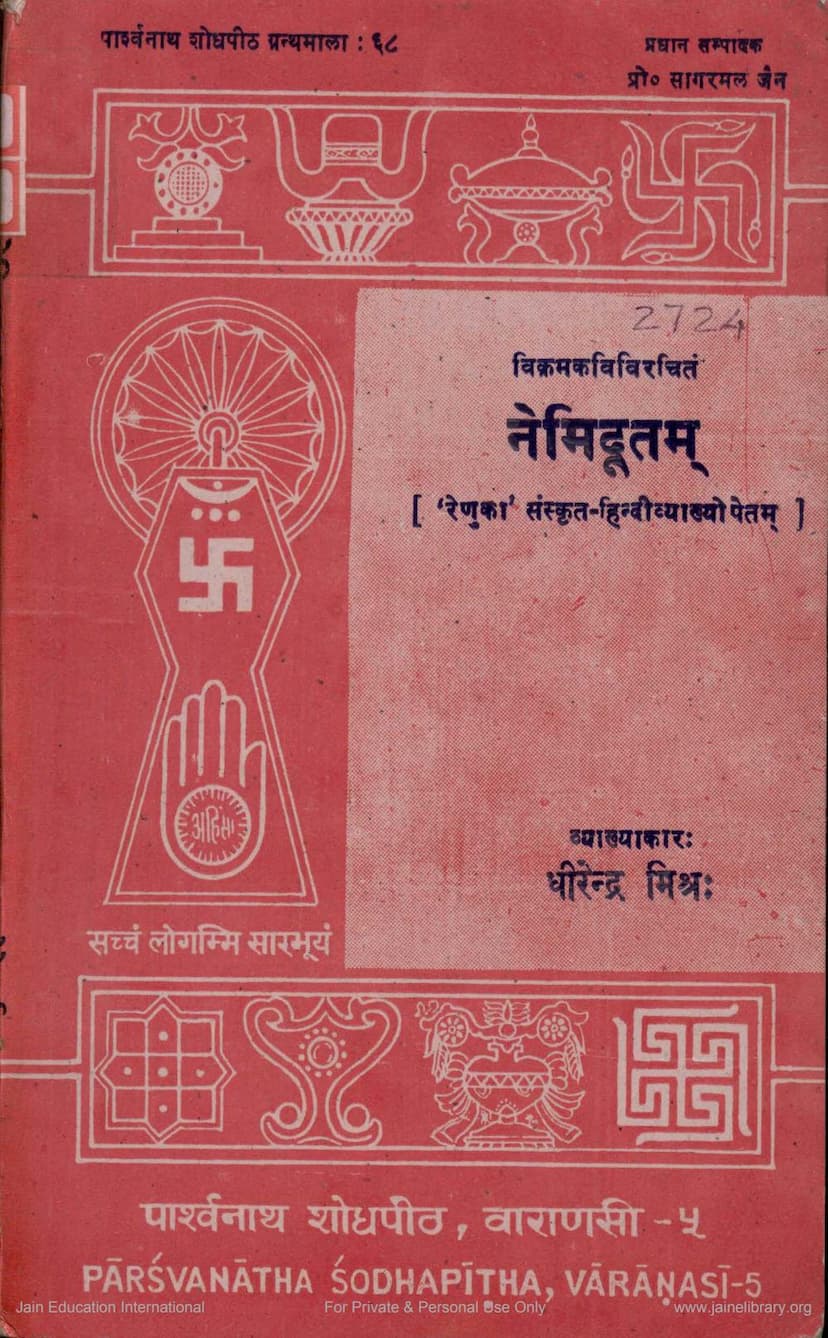Nemidutam
Added to library: September 2, 2025

Summary
This document is the introduction and commentary for "Nemidutam," a Jain text authored by Vikram Kavi, published by Parshwanath Shodhpith in Varanasi.
Here's a breakdown of the key information:
The Text:
- Title: Nemidutam (नेमिदूतम्)
- Author: Vikram Kavi (विक्रम कवि)
- Publisher: Parshwanath Shodhpith, Varanasi (पार्श्वनाथ शोधपीठ, वाराणसी)
- Commentary/Translation: Renuka (रेणुका) Sanskrit-Hindi Commentary by Dhirendra Mishra (धीरेन्द्र मिश्र)
- Series: Parshwanath Shodhpith Granthamala: 68 (पार्श्वनाथ शोधपीठ ग्रन्थमाला : ६८)
- Chief Editor: Prof. Sagar Mal Jain (प्रो० सागरमल जैन)
- First Edition: 1994
- Price: ₹ 75 (रुपये मात्र)
Content Overview:
The introduction, authored by Bhupendra Nath Jain (मन्त्री पू० सोहनलाल स्मारक पार्श्वनाथ शोधपीठ, वाराणसी), highlights the significance of Jain devotional poetry (Dootakavya) composed by Jain ascetics. It mentions other notable works in this genre like Jain Meghaduta, Sheeladuta, and Parshvabhyudaya. The introduction notes that Jain poets often emphasized detachment (Vairagya) over romantic love (Shringar).
The "Nemidutam" specifically focuses on the emotional state of Rajimati, who is deeply pining for Nemikumar. Nemikumar, having renounced worldly life, resides in a place of asceticism. Rajimati makes a fruitless attempt to win him back, but is eventually inspired by his renunciation and herself takes to ascetic practices.
The "Lekhakiya" (Author's Note) by Dhirendra Mishra explains the purpose of scriptures and poetry. He expresses his gratitude to his gurus, including Dr. Sagar Mal Jain and Dr. Ashok Kumar Singh, for their guidance. Mishra aims to make the poet's intentions clear to the readers and hopes his work will inspire further study.
The "Bhumika" (Introduction) provides an extensive overview of "Dootakavya" (message poetry) in Sanskrit literature, tracing its origins from Vedic times and citing examples like Hanuman's message to Sita, Krishna's message to the Gopis, and Nala's message to Damayanti via a swan. It then delves into the tradition of Jain Dootakavyas, mentioning authors like Merutunga, Charitsundargani, Vimalakirti, Meghavijaya, Jinendra, and Vikram Kavi. The introduction details numerous "Dootakavya" works, both Jain and non-Jain, categorized by the messenger used (e.g., cloud, wind, bird, bee, etc.) and their themes, often contrasting the emphasis on Vipralambha Shringar (separation in love) in non-Jain works with the prevalence of Shanta Rasa (peaceful emotion) in Jain literature.
The text then provides a detailed analysis of the "Nemidutam" itself, including:
- Storyline: It narrates the story of Nemikumar, the 22nd Jain Tirthankara, his renunciation prompted by the cries of animals destined for sacrifice at his wedding, his journey to Ramgiri for penance, Rajimati's devotion and following him, her attempts to dissuve him, and her eventual acceptance of the ascetic path after being influenced by his commitment.
- Author's Background: Information about Vikram Kavi is scarce, with the last verse of "Nemidutam" being the primary evidence of his authorship. The text discusses theories about his time period (possibly late 13th to early 14th century) and sect affiliation (possibly Kharatargachha).
- Literary Analysis: The work is analyzed as a "Dootakavya" and its dominant rasa (emotion) is identified as "Shanta" (peace), with "Vipralambha Shringar" (separation in love) also being depicted beautifully through Rajimati's plight.
- Descriptions: The text includes detailed descriptions of nature (monsoon, forests, seasons) and the city of Dwarka, highlighting its grandeur, opulence, and the divine presence of Krishna.
- Character Portrayals: The characters of Nemikumar, Rajimati, her mother Shiva, and Ugrasena are discussed, emphasizing their virtues and emotional experiences.
- Poetic Style: The commentary discusses the meter used (Mandakranta) and various poetic devices employed by the author.
- Commentary by Dhirendra Mishra: The extensive commentary ("Renuka Tika") provides word-by-word explanations, etymology, grammatical analysis, and literary interpretations of each verse. It also offers context from Jain philosophy and legends.
Overall:
The "Nemidutam," as presented in this edition, is a significant work of Jain literature that explores themes of renunciation, devotion, and the transformative power of spiritual pursuit, set against a backdrop of poetic descriptions of nature and the divine city of Dwarka. The commentary by Dhirendra Mishra provides a deep and scholarly exploration of the text.